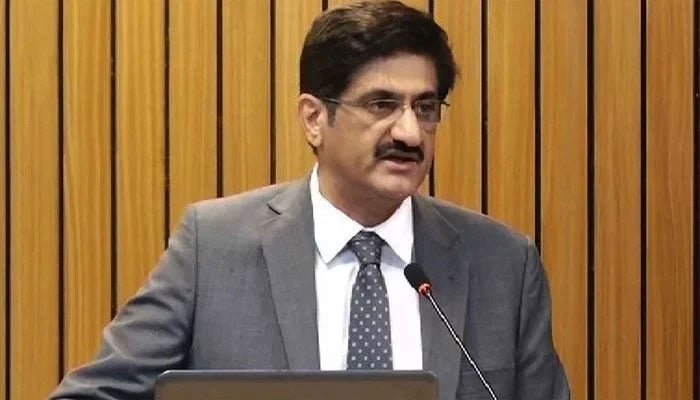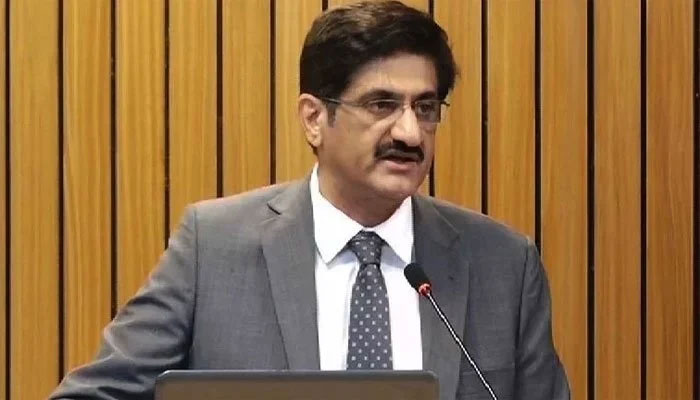Sindh Chief Minister Syed Murad Ali Shah on Saturday outlined an ambitious fiscal and development agenda for the province while addressing serious financial challenges and federal fiscal shortfalls.
At the outset of his post-budget press conference, Shah censured Israel’s recent attack on Iran, saying that he had already voiced his disapproval during the budget session, and subsequently convened an immediate meeting of the assembly to pass a resolution against the aggression.
He said the Pakistan Peoples Party (PPP) had presented its 17th consecutive provincial budget, attributing this milestone to political continuity and effective governance. He, however, criticised the federal government for failing to meet its financial commitments.
He revealed that Sindh was informed just a day before the budget presentation that Rs105 billion in expected funds would be withheld. “Sindh has received Rs1.4785 trillion from the federal divisible pool since last year, but Rs422.3 billion remains outstanding.”
Despite being under an International Monetary Fund (IMF) programme that demands strict fiscal discipline, the Sindh government will allocate Rs590 billion for development projects this year, with a total budget of Rs3.45 trillion: Rs1 trillion for development and Rs2.15 trillion for current expenditures.
Notably, Rs1.1 trillion is earmarked for salaries and pensions, leading to salary increases of 12 per cent for lower-grade employees and 10 per cent for higher grades.
Sectoral budget increases include an 18 per cent rise in education funding, and an 11 per cent increase in health. Funding for agriculture, irrigation and local government projects has also seen significant boosts. Furthermore, Rs236 billion has been allocated for infrastructure projects in Karachi, including public-private partnership initiatives.
Shah highlighted Sindh’s social welfare achievements, particularly in housing for flood victims, with 500,000 homes built and another 850,000 under construction, totalling 1.3 million. This rapid response has drawn international recognition, surpassing Nepal’s housing efforts after its earthquake.
To enhance rural living standards, the CM announced a Rs600 billion project for rural water and sanitation, benefiting 4.5 million villagers. This community-driven initiative will be completed within the current government’s tenure, with villagers constructing and managing the infrastructure under the NGO’s oversight, aiming to reduce waterborne diseases.
Regarding taxation, Shah noted that no new taxes were introduced in the budget, with some taxes eliminated or reduced, including the abolition of the entertainment tax, and cuts to restaurant taxes.
The stamp duty on third-party vehicle insurance has been reduced to Rs50, with a drop in the insurance tax from 15 per cent to five per cent.
To modernise governance, the Sindh government is digitising land records through blockchain for easier access. Free laser levellers will be provided to small farmers, with subsidies for larger ones, alongside the implementation of cluster farming technology.
The CM outlined the K-IV water project structure, where the Centre is responsible for sourcing water from the Keenjhar Lake, while the provincial government manages distribution, and has allocated the necessary funds.
A total of Rs20 billion is earmarked for the K-IV feeder, alongside plans for a costly five-million-gallon desalination plant. Despite challenges like federal funding shortfalls and IMF constraints, the Sindh government is focused on development, social welfare and financial prudence.
Shah highlighted critical infrastructure issues, specifically the K-IV water supply project, explaining its components and affirming full funding for the Sindh government’s role. He also criticised the Centre for allocating only 18 of the proposed 25 projects to Sindh after transferring public works department schemes to other provinces.
Additionally, he mentioned Sindh’s conditions for supporting the federal budget, emphasising equitable distribution of development schemes, and reversal of the detrimental cut to university funding from Rs4 billion to Rs2 billion, which has sparked protests.
On the critical Sukkur-Hyderabad Motorway, the CM expressed concern over the halving of federal funding from Rs30 billion to Rs15 billion. He called for renewed commitment from the Centre to start and complete the project within four years, with support from the Islamic Development Bank for three sections.
Talks are ongoing for international funding for the remaining segments of the motorway. Despite his offer to co-finance the project with Rs25 billion, if matched by the Centre, the CM lamented that this proposal was rejected.
Shah emphasised that major projects are not included in the Public Sector Development Programme, and criticised the 18 per cent tax on solar panels as unjust. He warned that the PPP would not support the federal budget if these issues remained unresolved.
Addressing the various challenges, he acknowledged delays in operating 150 buses in Karachi due to resource constraints, but highlighted ongoing infrastructure and sanitation projects. On digitisation he admitted the Sindh government has not fully digitised land records yet, but is piloting a blockchain project in Matli and Sukkur.
Regarding the Safe City project, he said the first phase is set for completion by September or October 2026, covering key Karachi areas. Early results show success with cameras already identifying security threats. Funds for Phase II have been allocated for 2026.
Shah asserted that the work of the Sindh government is evident, noting increased votes for the PPP. He indicated that global financial institutions are more willing to support Sindh than the Centre. After the August 2022 floods, the World Bank approved emergency financing for Sindh quickly, indicating trust in its administration.
In response to criticism over purchasing a new helicopter and vehicles for the CM’s Office, Shah said that the existing helicopter is 36 years old, and the official vehicle pool has not been updated for years.
He mentioned a government ban on vehicle purchases for the next fiscal year to limit non-essential spending. He revealed Rs25 billion allocated for solar energy projects, and the launch of afforestation programmes to combat climate change, admitting that more needs to be done.
Discussing the economic situation, he acknowledged worsening poverty in Sindh, saying that economic growth is necessary for poverty alleviation while noting the constraints imposed by the IMF programme.
On budget transparency, he mentioned the efforts to brief the opposition in the province about the budget, despite criticism regarding ignoring the proposal sent by the opposition lawmakers. He highlighted population growth as Pakistan’s biggest challenge, noting the Sindh government’s merger of population welfare and health departments to address it.
He also addressed the controversy surrounding a resolution on Israeli aggression presented in the provincial assembly the previous day, alleging that opposition members exploited the issue for political gain instead of any genuine action.
He expressed a commitment to maintaining dialogue with the opposition parties, though he criticised their focus on unfounded complaints. He asserted that the PPP government would not be blackmailed either by the Pakistan Tehreek-e-Insaf or the Muttahida Qaumi Movement.



